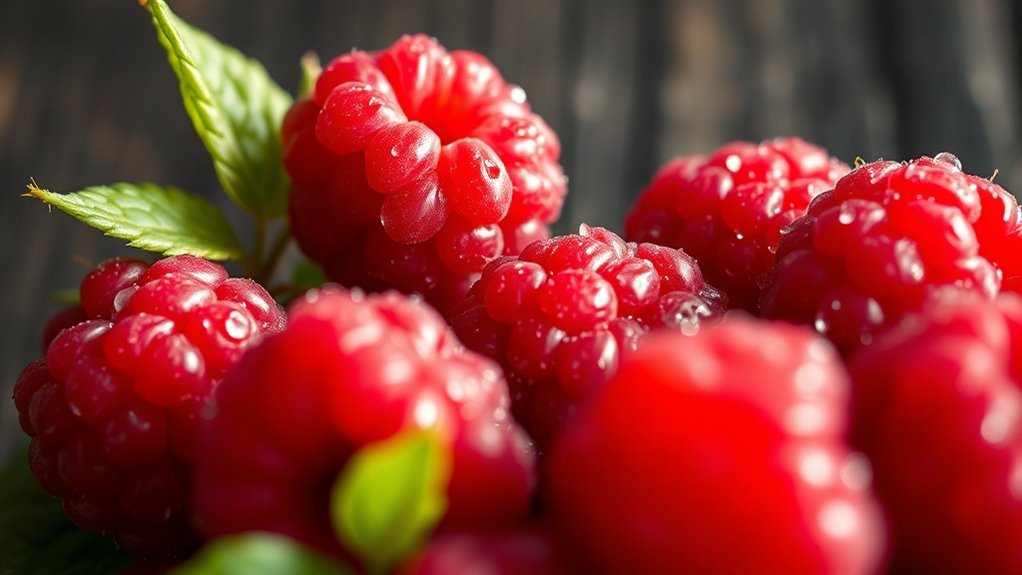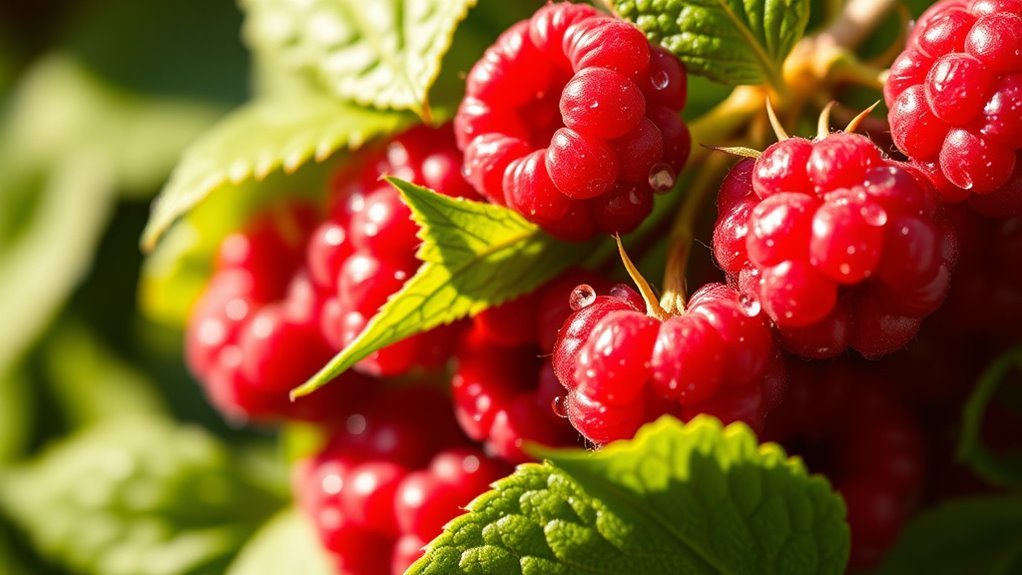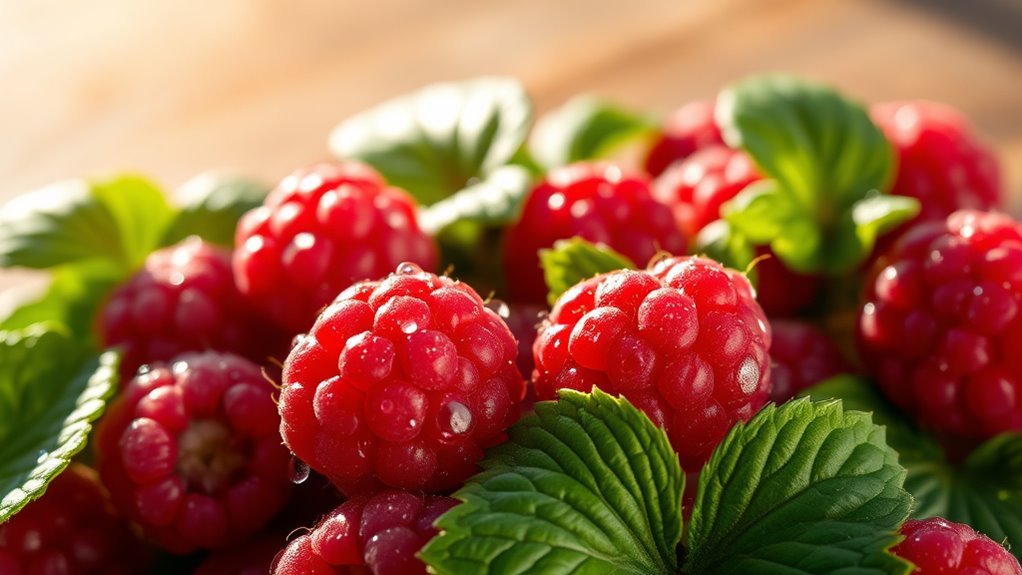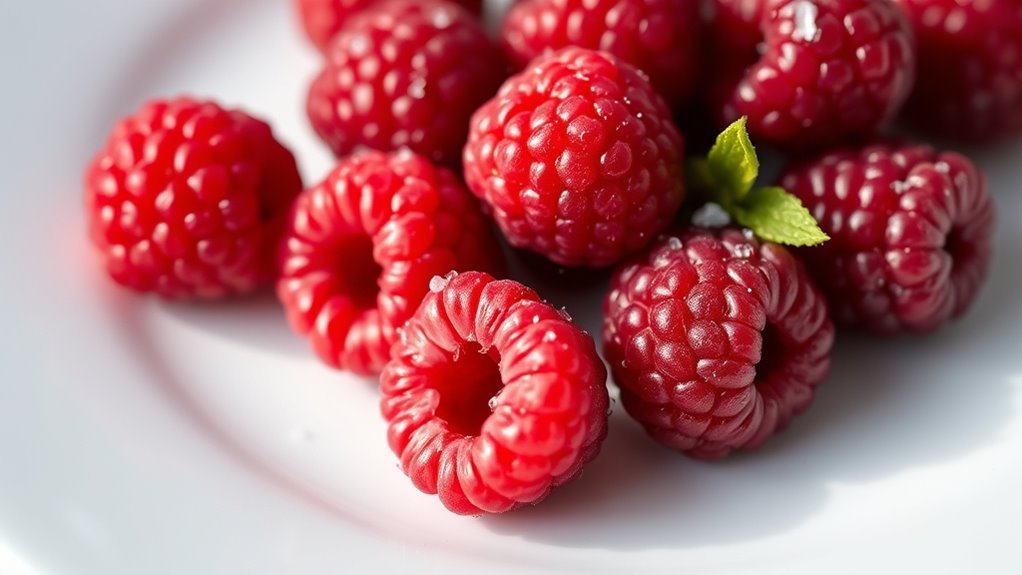Yes, raspberries can be keto-friendly! They have about 11.9 grams of carbohydrates per 100 grams, but their high fiber content means their net carbs are lower. A cup contains around 15 grams of carbs, which fits into most keto plans with careful portion control. These berries are also rich in vitamins and antioxidants. If you want to explore how to incorporate raspberries into your keto meals, there’s plenty to discover!
Nutritional Breakdown of Raspberries

When exploring the nutritional breakdown of raspberries, you’ll find that these vibrant berries pack a surprising punch for a low-carb diet. Their nutritional value is impressive, as they’re low in calories yet high in essential nutrients. A cup of raspberries contains about 65 calories, along with dietary fiber, which promotes digestive health. You’ll also appreciate their rich vitamin content; they’re a great source of vitamin C, which supports immune function and skin health. Additionally, raspberries provide vitamins K and E, contributing to overall wellness. With their antioxidants, these berries can help combat oxidative stress. Incorporating raspberries into your diet not only satisfies your taste buds but also enhances your nutrient intake while keeping carbs in check.
Carbohydrate Content in Raspberries

Carbohydrate content is an essential factor to take into account when evaluating whether raspberries fit into a ketogenic diet. Generally, raspberries are lower in carbs compared to many other fruits, making them suitable for keto-friendly desserts. Here’s a quick breakdown of common raspberry varieties:
| Raspberry Variety | Carbohydrates (per 100g) |
|---|---|
| Red Raspberries | 11.9g |
| Black Raspberries | 10.3g |
| Golden Raspberries | 11.5g |
| Purple Raspberries | 12.2g |
With their naturally sweet flavor, you can enjoy them in moderation while sticking to your carb limits. Just remember, incorporating these berries into your diet can be both delicious and satisfying without straying from your keto goals.
Fiber and Its Role in a Keto Diet

Although many people focus primarily on reducing carbohydrates for a successful ketogenic diet, fiber plays a crucial role in maintaining overall health and digestive function. There are two main fiber types: soluble and insoluble. Soluble fiber helps regulate blood sugar levels and can be found in sources like avocados and chia seeds. Insoluble fiber, on the other hand, aids in digestion and is present in vegetables and nuts. Including these fiber sources in your diet can enhance your keto experience by promoting gut health and preventing constipation. While you’re counting carbs, don’t overlook fiber; it’s essential for feeling full and satisfied. Balancing your intake of fiber-rich foods can empower you to maintain your ketogenic lifestyle while enjoying a diverse and healthy diet.
Comparing Raspberries to Other Berries
While fiber-rich foods are important for a ketogenic diet, it’s also beneficial to understand how different fruits fit into your overall carb count. When you consider berry comparisons, raspberries often stand out due to their lower net carbs and higher fiber content compared to other berry varieties. For instance, strawberries and blueberries typically contain more sugar and carbs, making them less ideal for strict keto followers. However, different raspberry varieties can also affect your carb intake—some might be sweeter than others. By evaluating these berry comparisons, you can make informed choices that align with your keto goals while enjoying the freedom of incorporating delicious fruits into your diet.
Portion Control: How Many Raspberries Can You Eat?
How many raspberries can you enjoy without exceeding your carb limits on a keto diet? While raspberries are low in carbs compared to many fruits, portion sizes still matter. You can savor these delicious berries while keeping your carb count in check. Here are some serving suggestions to take into account:
- 1/2 cup: This portion contains about 3-4 grams of net carbs, making it a great choice for a snack.
- 1/4 cup: A smaller serving with roughly 2 grams of net carbs, perfect for adding to salads or yogurt.
- 1 ounce: If you want a bite-sized treat, this portion has about 1.5 grams of net carbs.
Balancing your enjoyment with controlled portions will help you stay within your keto goals.
Health Benefits of Raspberries
Raspberries offer a wealth of health benefits that can complement a keto diet, especially when you’re mindful of portion sizes. One of the standout features of raspberries is their high antioxidant properties, which help combat oxidative stress and inflammation in your body. This can be particularly beneficial for maintaining overall health and well-being.
Additionally, raspberries support heart health due to their fiber and nutrient content. They contain essential vitamins like vitamin C and potassium, which contribute to cardiovascular health by helping regulate blood pressure and cholesterol levels. Including raspberries in your diet can provide you with these advantages while keeping your carb intake in check, allowing you the freedom to enjoy a delicious and nutritious fruit without compromising your keto goals.
Incorporating Raspberries Into Keto Recipes
If you’re looking to enhance your keto meals, incorporating raspberries can add flavor and nutrition without tipping your carb balance. Here are three delicious ways to include them in your recipes:
- Keto Raspberry Smoothies: Blend raspberries with unsweetened almond milk, spinach, and a scoop of keto-friendly protein powder for a revitalizing drink packed with nutrients.
- Raspberry Salad Dressings: Whisk together fresh raspberries, olive oil, apple cider vinegar, and a pinch of salt for a tangy dressing that elevates any salad.
- Raspberry Chia Pudding: Combine chia seeds, coconut milk, and mashed raspberries for a satisfying dessert that’s low in carbs and high in fiber.
These ideas not only fit your keto lifestyle but also keep your meals exciting and delicious!
Potential Risks of Eating Raspberries on Keto
While raspberries are often considered a keto-friendly fruit, their carb content can still pose concerns for some individuals. If you’re sensitive to sugar, even the natural sugars in raspberries might impact your ketosis. It’s important to monitor your overall carbohydrate intake to guarantee you remain within your daily limits.
Carb Content Concerns
Although they’re often praised for their health benefits, the carb content of raspberries can raise concerns for those following a strict keto diet. When you’re carb counting, it’s vital to be aware of how raspberries fit into your nutritional balance. Here are a few points to reflect on:
- Carb Content: One cup of raspberries contains about 15 grams of carbs, which can add up quickly.
- Fiber Factor: While they’re high in fiber, you still need to account for the net carbs, which can impact ketosis.
- Portion Control: Enjoying raspberries in moderation is important; even small amounts can affect your daily carb allowance.
Incorporating these reflections will help you enjoy raspberries while maintaining your keto goals.
Sugar Sensitivity Issues
For those on a keto diet, the sugar sensitivity that can arise from consuming raspberries warrants careful consideration. While raspberries are low in carbs, their natural sugars can still affect individuals sensitive to sugar. If you’re prone to sugar spikes, you might experience cravings or energy crashes after eating them. It’s vital to monitor your body’s response, as everyone’s sensitivity varies. Consider raspberry alternatives, like blackberries or strawberries, which may have lower sugar content and can satisfy your sweet tooth without the risks. Remember, finding what works for you is significant on a keto journey. Staying informed and mindful of your options will help you maintain your freedom in food choices while adhering to your dietary goals.
How to Choose the Best Raspberries
When you’re looking to choose the best raspberries, it’s vital to take into account several key factors to guarantee you’re selecting ripe and flavorful fruit. Here are three essential tips for choosing raspberries:
- Color: Look for vibrant, deep red raspberries. Pale or dull ones often indicate under-ripeness.
- Texture: Gently squeeze the berries; ripe raspberries should be firm yet slightly soft. Avoid mushy ones as they may be overripe.
- Aroma: A sweet, fragrant scent is a good sign of freshness. If they lack aroma, they might not be ripe raspberries.
Final Thoughts on Raspberries and Keto
While many people following a keto diet focus on minimizing carbohydrate intake, raspberries can actually be a delicious and nutritious option. With their low net carb content, these berries offer a variety of health benefits, including antioxidants and vitamins. You’ll find several raspberry varieties, each bringing unique flavors and textures to your meals. Incorporating them into your diet can inspire creativity in your cooking, especially when crafting keto-friendly desserts. From raspberry cheesecake to sugar-free raspberry sauces, the possibilities are endless. Just remember to enjoy them in moderation, as portion control is key. Ultimately, raspberries can be a delightful addition to your keto journey, providing both taste and health benefits without compromising your goals.
Frequently Asked Questions about Raspberries and the Keto Diet
1. Are raspberries keto-friendly?
Yes, raspberries are considered keto-friendly! They are low in carbohydrates and high in fiber, making them an excellent choice for those following a ketogenic diet. A 100-gram serving of raspberries contains about 12 grams of carbohydrates, but with 7 grams of fiber, the net carbs are only about 5 grams. This makes them a great option for satisfying sweet cravings without interfering significantly with ketosis.
2. How many raspberries can I eat on a keto diet?
While the amount can vary based on individual carb limits, a typical serving of around 100 grams (about 1 cup) of raspberries is generally acceptable on a keto diet. It’s important to keep track of your overall daily carbohydrate intake, so you may want to limit your portion to about a half-cup if you’re closer to your carb limit. Always listen to your body and adjust accordingly!
3. What are the nutritional benefits of raspberries on a keto diet?
Raspberries provide several nutritional benefits for those on a keto diet. They are rich in vitamins C and K, and antioxidants, which can help reduce inflammation and support overall health. The high fiber content in raspberries also aids digestion and can help you feel full, making it easier to stick to your dietary goals. Additionally, their natural sweetness can satisfy cravings for sugary treats without derailing your ketosis.
4. Can I use raspberries in keto recipes?
Absolutely! Raspberries can be a versatile ingredient in many keto recipes. You can use them in smoothies, salads, desserts, or as a topping for keto pancakes or yogurt. Just be sure to account for the carbs in your overall meal plan. They can add a delicious burst of flavor and color to your dishes while keeping them low in carbs.
5. Are there any potential downsides to eating raspberries on a keto diet?
While raspberries are keto-friendly, it’s important to consume them in moderation. Eating excessive amounts can increase your carb intake, potentially affecting ketosis. Additionally, some individuals may have sensitivities to certain fruits, which can lead to digestive issues. Always monitor your body’s response and consult with a healthcare provider if you have any concerns about including raspberries in your diet.
References
- https://www.healthline.com/nutrition/are-raspberries-keto
- https://www.verywellfit.com/are-raspberries-keto-friendly-5118880
- https://www.medicalnewstoday.com/articles/324131
- https://www.ncbi.nlm.nih.gov/pmc/articles/PMC6516540/
- https://www.dietdoctor.com/low-carb/foods/berries
- https://www.ketogenic.com/raspberries-on-keto-diet/
- https://www.webmd.com/diet/obesity/what-to-know-about-keto-diet
- https://www.nutrition.gov/topics/nutrition-education/health-and-nutrition-articles/what-are-raspberries-nutrition-facts


